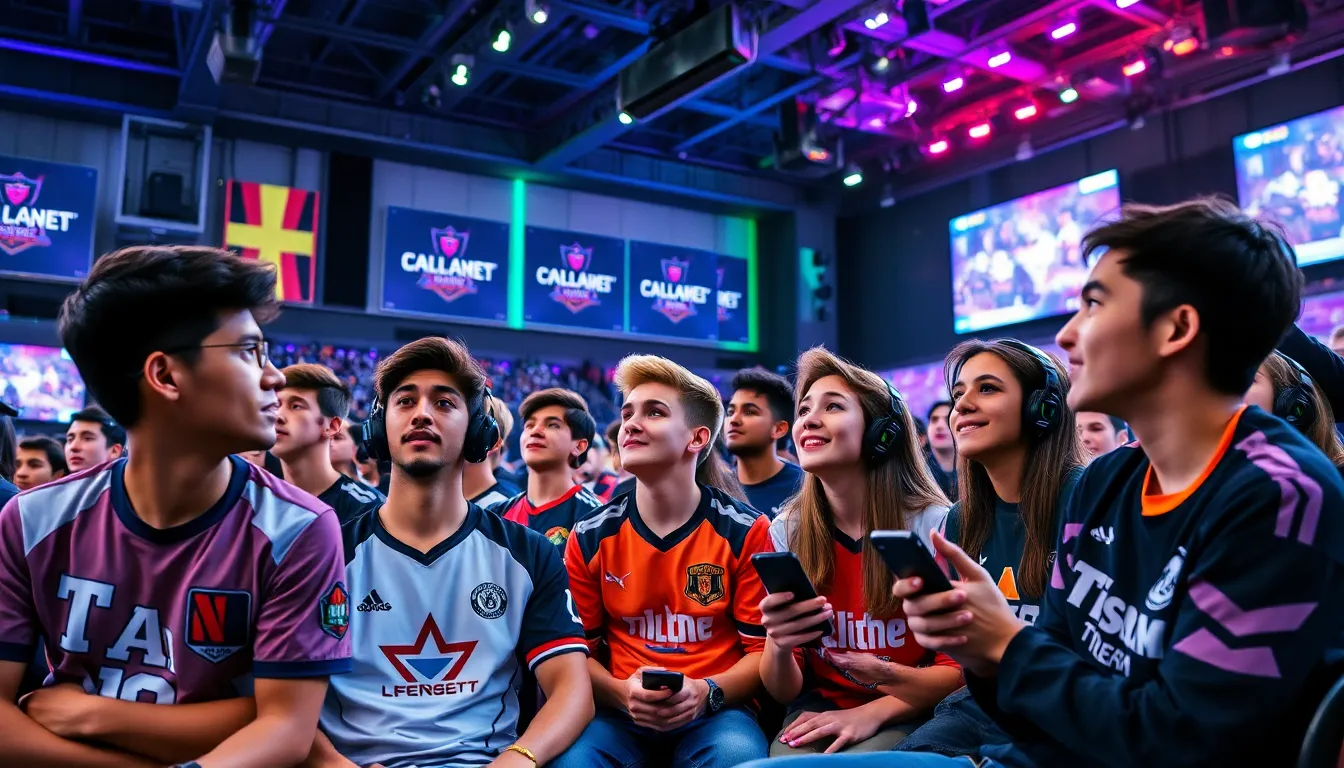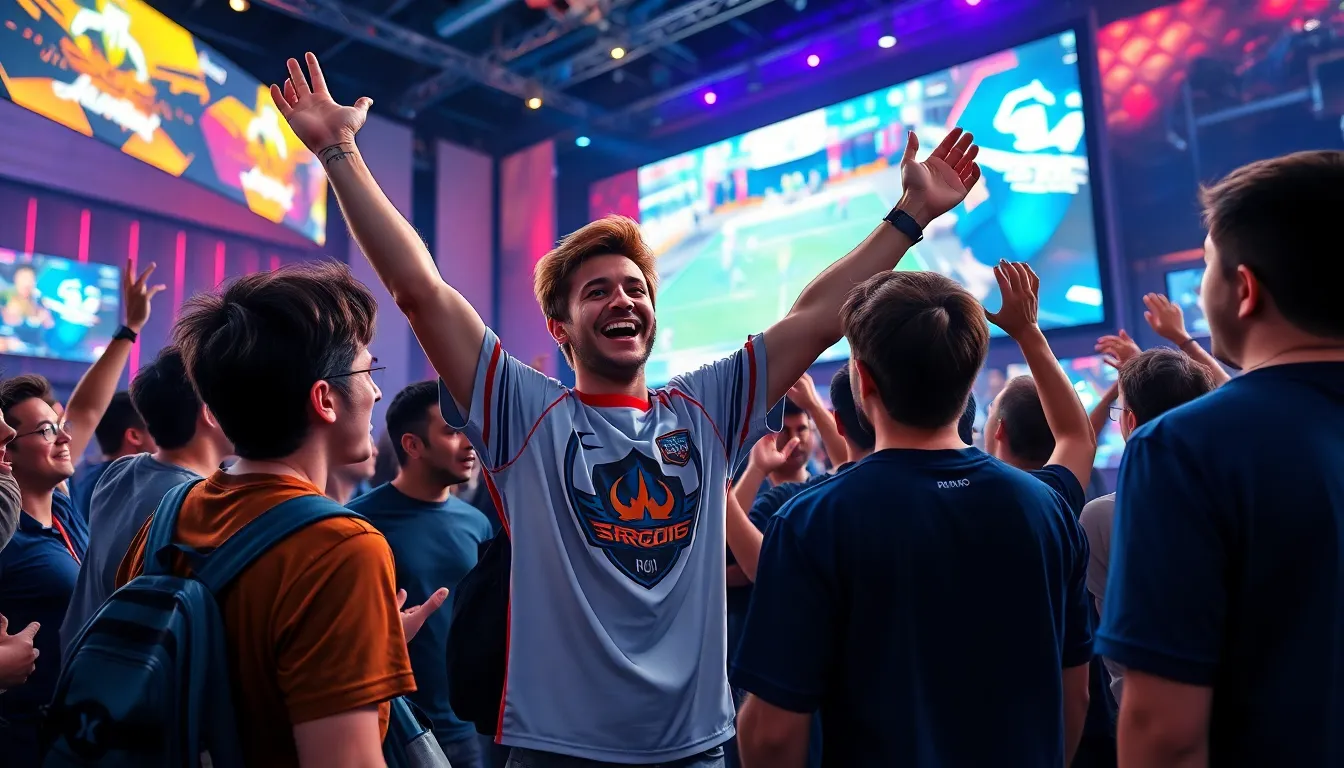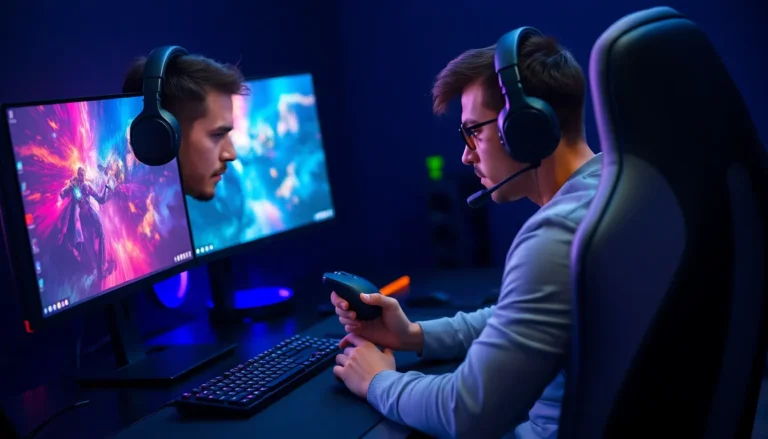In the fast-paced world of esports, where gamers become legends and tournaments draw millions of viewers, one crucial player often goes unnoticed: the sponsors. These savvy brands are not just slapping their logos on jerseys; they’re diving headfirst into a multi-billion dollar industry that’s changing the game—literally. With the right sponsorship, companies can connect with a dedicated audience that’s passionate about gaming and eager to engage.
Table of Contents
ToggleOverview of Esports Sponsors
Brands in the esports sector play a crucial role in shaping the landscape of competitive gaming. Companies like Intel, Red Bull, and Coca-Cola invest heavily, finding ways to engage with the youthful and tech-savvy gamer demographic. These partnerships create visibility and enhance brand loyalty among fans.
Marketing strategies for esports sponsors often focus on digital platforms, where gaming communities thrive. Twitch, YouTube, and social media channels receive significant attention, allowing brands to interact directly with audiences. From streaming events to team activations, sponsorships create touchpoints that resonate with fans.
The financial impact of sponsorships isn’t negligible, with annual investments reaching approximately $1.5 billion in 2023. Diversified sponsorship types, including team deals, tournament sponsorship, and in-game promotions, fuel easier market entry and broader audience reach.
Metrics such as brand visibility, engagement rates, and return on investment guide companies in assessing the effectiveness of their sponsorship ventures. Research indicates that over 50% of esports audiences express brand loyalty to sponsors, showcasing the potential for continued growth.
Innovative activations are essential within the esports domain. Engaging fans through interactive experiences or exclusive merchandise drive deeper connections between brands and players. By targeting niche communities, sponsors can capitalize on specific interests within the vast gaming ecosystem.
Importance of Esports Sponsorship

Esports sponsorship plays a crucial role in shaping the industry. Brands actively connect with this vibrant community, expanding their reach and influence.
Brand Visibility
Increased brand visibility emerges as a primary benefit of esports sponsorship. Companies like Intel and Coca-Cola achieve significant exposure through team jerseys, event banners, and digital placements. Research shows sponsors gain access to millions of enthusiastic viewers across platforms. Over 50% of esports audiences recall sponsors’ branding, which enhances brand recognition. Additionally, strategic placements during high-traffic streaming hours amplify exposure further. Accessible content features sponsors prominently, ensuring constant visibility during gameplay and tournaments. Overall, effective sponsorship translates into measurable increases in awareness, driving potential customers toward engaging brands.
Target Audience Engagement
Target audience engagement represents another key advantage of esports sponsorship. The gaming community consists primarily of young, tech-savvy individuals who actively seek immersive experiences. Esports allows brands to interact directly through social media and streaming platforms like Twitch and YouTube. Sponsors engage audiences via live chats, Q&A sessions, and interactive promotions that foster a sense of community. Metrics indicate that over 50% of esports viewers demonstrate loyalty to brands that invest in their interests. These connections grow stronger when sponsors offer exclusive content and incentives, reinforcing brand affinity. Enhanced engagement not only drives awareness but also promotes long-term consumer relationships, contributing to overall market success.
Types of Esports Sponsors
Esports sponsorships come in various forms, each contributing uniquely to the industry’s growth. By understanding these types, brands can tailor their strategies to maximize engagement with the gaming community.
Corporate Sponsors
Corporate sponsors represent a significant investment in esports. These companies, including major tech and beverage brands, often seek to improve brand visibility among the youthful audience. Their contributions manifest in team deals, league partnerships, and event sponsorships. Notable examples include Intel and Red Bull, both renowned for their active participation in major tournaments. Investing amounts to millions, directly impacting audience engagement and overall gaming experiences. This connection enables brands to capture the attention of avid gamers who remember the sponsorships through various promotional activities.
Product Sponsors
Product sponsors focus on showcasing specific goods related to gaming. Brands offering peripherals, games, and gaming hardware often partner with teams or events to promote their products. These sponsors benefit from direct visibility during live streams and competitive events. For instance, gaming chair manufacturers often supply teams with their products, ensuring exposure in high-stakes competitions. The strategy is effective, as fans frequently relate the product to the team’s success. This synergy helps build loyalty among audiences, who are more likely to purchase products endorsed by their favorite players.
Current Trends in Esports Sponsorship
In 2023, esports sponsorship reaches new heights, with investments totaling approximately $1.5 billion. This significant financial commitment reflects brands’ recognition of esports as an essential marketing venue. Companies increasingly leverage digital platforms like Twitch, YouTube, and social media to enhance engagement with tech-savvy audiences. Innovative marketing strategies include live interactions, targeted ads, and experiential campaigns that resonate with younger fans.
Brands also diversify their involvement through various sponsorship types. Team deals often feature prominently in strategies, establishing strong connections between companies and fan bases. League partnerships enhance brand visibility and credibility while event sponsorships create memorable experiences for audiences. Each type allows sponsors to effectively reach the vibrant gaming community.
Increased focus on brand storytelling emerges as a vital trend. Sponsors craft narratives around their products, aligning them with the cultures and values of gaming communities. Authenticity plays a crucial role in this process, as gamers tend to favor brands that genuinely engage with their interests. Sponsors that convey their message through relatable content foster strong loyalty among fans.
Moreover, data highlights the importance of audience recall. Research indicates that over 50% of esports viewers can remember sponsors’ branding, showcasing the effectiveness of carefully executed sponsorships. Engaging directly through interactive promotions cultivates a sense of community, allowing sponsors to form lasting relationships with consumers.
As gaming enthusiasts demand immersive experiences, sponsors respond by prioritizing interactive elements. Such strategies not only enhance viewer engagement but also solidify sponsors’ places within the industry. Current trends illustrate how esports sponsorship evolves, making it a cornerstone of marketing strategies in technology and entertainment sectors.
Success Stories of Esports Sponsorship
Intel exemplifies successful esports sponsorship through its long-standing partnerships with various tournaments and teams. This engagement has significantly elevated brand visibility in the gaming community. Red Bull, known for its energy drinks, has transformed its marketing strategy by hosting esports tournaments and sponsoring professional players. This commitment cultivates a strong connection with the youth demographic.
Coca-Cola stands out by creating unique campaigns that resonate with gamers. Working in collaboration with esports organizations, the brand developed interactive promotions that enhance audience engagement. Sponsors focusing on engagement often see substantial returns, as noted by research indicating over 50% of esports audiences recalling sponsor branding.
Activision Blizzard’s Overwatch League offers another example, showcasing brands integrating into the gaming experience. Team jerseys donning sponsor logos provide constant visual reminders, ensuring that brand names are ingrained in viewers’ minds. Event sponsorships also allow companies to reach new audiences, making them a preferred marketing tactic.
Investment figures underscore the trend. Esports sponsorships reached approximately $1.5 billion in 2023, illustrating the value brands place on this emerging arena. Companies embracing storytelling strategies in their campaigns create narratives that resonate with gaming cultures. Brands successfully fostering community relationships find increased loyalty among fans who feel an authentic connection to the sponsorship.
Ultimately, these success stories illustrate the transformative impact of esports sponsorship on brand visibility and audience engagement, marking the industry as a crucial marketing frontier.
Esports sponsorship is reshaping the marketing landscape by providing brands with unparalleled access to a vibrant and engaged audience. As companies like Intel, Red Bull, and Coca-Cola demonstrate, strategic investments in this space yield significant returns in brand visibility and consumer loyalty.
With the industry projected to reach $1.5 billion in sponsorship investments, brands are recognizing the potential of immersive experiences and authentic storytelling. By leveraging digital platforms and fostering direct interactions, sponsors are not only enhancing their market presence but also building lasting connections with the gaming community.
As esports continues to grow, the role of sponsors will remain crucial in driving both industry innovation and audience engagement.





